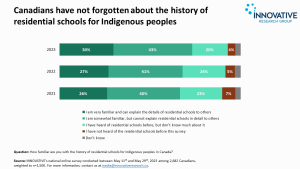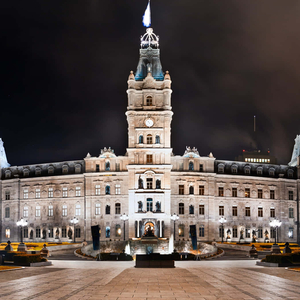
Two years after the discovery of potential graves of an estimated 215 Indigenous children on the site of the former Kamloops Indian Residential School, Canadians are still attentive to and angry about Canada’s history of residential schools and believe it requires an ongoing government response.
Today, on June 21st, 2023, National Indigenous Peoples Day, Canada commemorates the history, heritage, resilience, and diversity of First Nations, Inuit, and Métis peoples. INNOVATIVE is releasing the first in a series of posts that provide updates on our tracking of Canadian opinions and attitudes towards Indigenous issues, a study that began in 2007.
A May poll by INNOVATIVE surveyed 2,682 Canadians, tracking their attitudes towards Indigenous’ peoples, groups, and organizations. The survey results are weighted to reflect the demographic composition of the actual population using Census data. A detailed methodology is provided in the report.

Often, in fact, almost all the time, events seize our attention while they’re happening and are then forgotten. However, this is not the case when it comes to the Kamloops discovery and Canadians’ views towards the treatment of Indigenous peoples in Canadian residential schools.
The results of the poll indicate that most Canadians have not forgotten about these events and are still feeling angry. Currently, 73% of Canadians are familiar with the history of residential schools, representing a 5-point increase since last year and the highest level recorded in our tracking. Furthermore, 72% of Canadians are aware of the Kamloops discovery, steady since last year.
4-in-5 (79%) Canadians are still angry about the treatment of Indigenous peoples in residential schools. Only 12% report not being angry. While the feeling of anger is slightly lower than immediately following the discovery of the potential graves in 2021, it has experienced a slight increase from last year.
When it comes to reparations and acknowledgements from government to residential school survivors, about half (47%) say that that government efforts have been too little.
Most importantly, Canadians see the Kamloops discovery as an ongoing issue. Nearly two-thirds (64%) say that this discovery reminds us that the history of residential schools still requires government responses today.




































